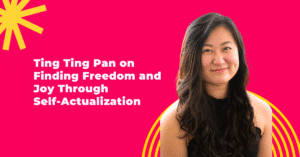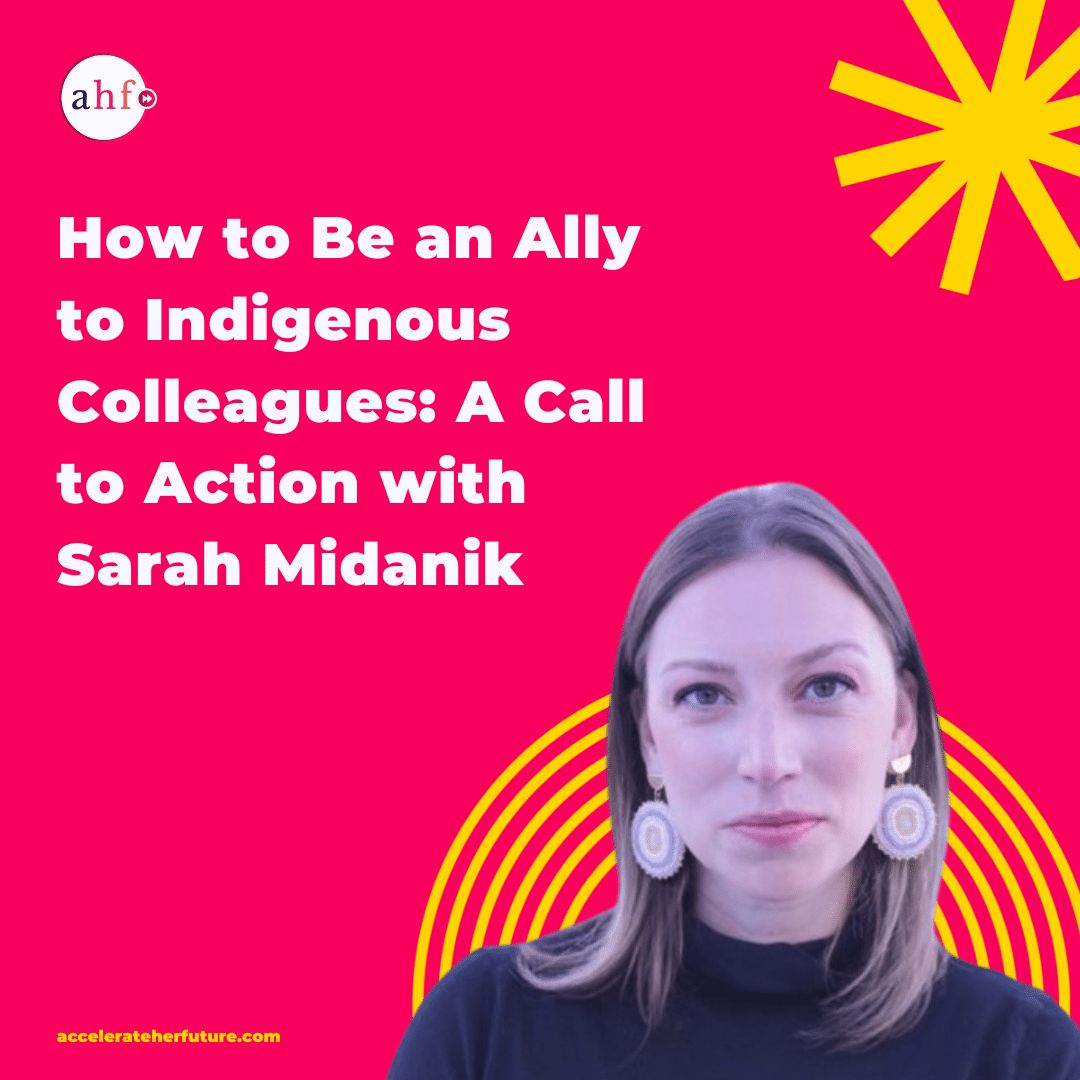

Written by Dr. Golnaz Golnaraghi, Founder and President of Accelerate Her Future
What does it really mean to be an ally? It’s a question that too often gets answered with a job title, a social post, or a symbolic gesture. But as Sarah Midanik, President & CEO of the Gord Downie & Chanie Wenjack Fund, reminded us at the 2024 Accelerate Her Future Virtual Summit: Flourish, “Allyship is not a label we give ourselves, it’s a responsibility we carry. And it’s one that must be met with courage, care, and a deep commitment to change.”
Speaking on the panel, Not All Sponsors & Allies Are Created Equal: An Intersectional Look at Allyship for Indigenous, Black and Racialized Women at Work, Sarah brought clarity, urgency, and depth to the conversation on what meaningful allyship looks like, especially in the context of reconciliation, systemic racism, and the lived realities of Indigenous professionals in the workplace.
Sarah’s words invite us to look closely at how power operates in our workplaces: who carries the burden of representation, who opens doors, and who stays silent when it matters most. Through her lens, we’re reminded that allyship is not identity, it’s responsibility. One that demands discomfort, reciprocity, and above all, action.
In many workplaces, allyship is often approached with good intentions, but it can remain surface-level without deeper reflection and commitment.
“If you surveyed a workplace, everyone would stick up their hand and say, ‘I am an ally.’ It’s in those moments when you have to lean into the discomfort, when you have to call out racism or systemic bias, that you’ll see the difference between active and performative allyship,” explained Sarah.
This means speaking up, even when it’s uncomfortable. It means challenging hiring practices that exclude. It means recognizing that true system change does not happen in comfort. It happens when we stretch ourselves beyond what feels safe and familiar.
At Downie Wenjak, this is called ReconciliAction—intentional, ongoing action in pursuit of reconciliation. It’s not about what we say. It’s about the decisions we make, the power we share, and how consistently we show up for the Indigenous communities we claim to support.
One of the most overlooked yet harmful practices in many workplaces is the unspoken expectation that Indigenous employees should be the “go-to” voice for all things Indigenous.
Sarah named this clearly and courageously. “Especially within organizations that may not have a ton of Indigenous employees, it becomes an emotional burden,” asserted Sarah. “It’s difficult for these employees to have the weight and responsibility to be the pan-Indigenous rep for all things.”
Even when this happens with good intentions, the result can be extractive.
Sarah reminded us that without positional power, resources, or clear consent, inclusion can quickly become exploitation. And this burden often goes unrecognized, especially when it’s layered on top of already demanding full-time roles.
Meaningful allyship requires us to ask before we expect. To check in. To set boundaries together. And to ensure that organizational efforts toward reconciliation are co-created with, not solely carried by, Indigenous employees.
Sarah highlighted how true allyship means making sure those relationships are reciprocal and not extractive. Everything that began with good intentions needs to remain so, and that requires constant care and reflection.
Too often, workplaces expect early-career Indigenous women to seek out mentorship or opportunities on their own. But Sarah challenged us to rethink this dynamic.
“A lot of times, sponsorship is what leads to increased opportunities. That’s what leads to the promotion, the board appointment, the advisory committee seat,” notes Sarah. “It’s about asking: are you in a position of leadership or privilege within your organization? Can you be that person for someone else?”
She pointed to structural inequities, like lack of family or community networks in corporate spaces, that make it harder for Indigenous professionals to access the kinds of opportunities others take for granted. Allyship, when coupled with sponsorship, becomes a powerful lever for change. It’s not just about being available, it’s about being proactive, removing barriers, and facilitating access to growth.
When organizations design systems, such as sponsorship programs or equitable promotion pathways, with this in mind, they begin to shift from performative gestures to meaningful impact.
Sarah’s reflections remind us that allyship isn’t a performance, it’s a practice.
And real change requires us to examine how power, privilege, and positionality show up in our day-to-day decisions.
We each have a role to play. Whether you’re an HR leader, a team manager, or an individual contributor, ask yourself: What am I doing to ensure Indigenous professionals in my workplace are not only included, but supported, sponsored, and set up to thrive?
And let’s not stop at allyship. Let’s take that next bold step, toward shared power, deeper accountability, and transformative relationships rooted in trust.
Because the true measure of allyship? Happens in the moments when no one is watching.